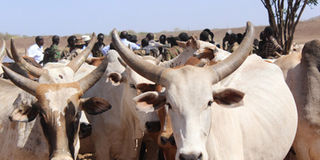Livestock farmers in Narok to get free cow semen

The Narok County will import cow semen worth Sh100 million from Israel which will then be distributed free of charge to livestock farmers. Governor Samuel Ole Tunai said his government will procure semen from top bulls and cross breed it with local breeds. PHOTO/FILE.
What you need to know:
- It will then be distributed to farmers for free in an initiative aimed at improving milk and meat production in the region.
- Mr Tunai said livestock farmers in the region need high yielding, dual-purpose cows that can be used for both dairy and beef production.
- The governor lamented that livestock farming, which most farmers practice for subsistence, has been neglected.
Narok County will use Sh100 million to import cow semen from Israel.
It will then be distributed to farmers for free in an initiative aimed at improving milk and meat production in the region.
Narok governor, Samuel Ole Tunai said his government will procure semen from top bulls and cross breed it with local breeds and dairy cows in a move geared towards improving farmers’ earnings.
Speaking in Ongata Barikoi in Transmara Sub-County, Mr Tunai said livestock farmers in the region need high yielding, dual-purpose cows that can be used for both dairy and beef production.
“We are trying to introduce to farmers a breed that will give them higher returns and encourage them to practice dairy farming as a profitable business,” Mr Tunais said.
The governor lamented that livestock farming, which most farmers practice for subsistence, has been neglected.
He added that he has plans to make the county a major of livestock producer and that he intends to form a marketing board that will help to widen this marketing initiative.
Mr Tunai said livestock farming is headed to be the leading economic mover of the county after Brazilian investor announced plans to establish an abattoir in the county.
The investor is among 50 Brazilian companies who have expressed interest in partnering with the Narok County government in a programme that will also see the establishment of a meat processing plant at Ewaso Nyiro and a waste recycling plant in Narok Town.
“Livestock farmers will benefit a lot with this but we must improve the breeds we have, like the zebus to a more superior bread,’ said Mr Tunai.





